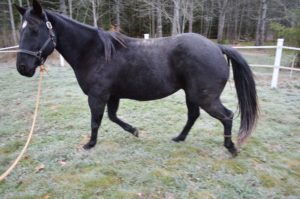This week, we hear from Julie Kenney, an incoming member of the Best Horse Practices Summit steering committee. She lives and rides in Harpswell, Maine.
Read her Focus on Fitness articles here.
By Julie Kenney
 Recently, I read an Eclectic Horseman article titled “The Ten-Minute Horseman.” It certainly seemed appropriate given the shorter days we are all now experiencing. My horses are on outside turnout all the time, except when they are brought in the barn during nasty storms. Lately, ten minutes may be all I can spend with them beyond feeding hay, tending to water, and removing manure.
Recently, I read an Eclectic Horseman article titled “The Ten-Minute Horseman.” It certainly seemed appropriate given the shorter days we are all now experiencing. My horses are on outside turnout all the time, except when they are brought in the barn during nasty storms. Lately, ten minutes may be all I can spend with them beyond feeding hay, tending to water, and removing manure.
In the evenings, I like to start early enough to get chores done before it is completely dark out. Sometimes, though, I’m running late or we have cloudy, drizzly, snowy skies which brings on the dark earlier.
Ten minutes:
- To talk quietly with my horses.
- To look them over or rub them where they aren’t covered in mud.
 I ask myself:
I ask myself:
- Are the horses looking relaxed and content?
- Are they moving around without indication of pain or soreness?
- How are their winter coats coming in?
- Are they maintaining, or even adding, weight for the winter?
- Is the herd hierarchy the same? Changes in hierarchy are a sure sign one of them isn’t feeling well, especially in the Northeast where Lyme Disease is so prevalent.
Ten minutes is enough time to get a handle on herd health. It’s certainly nice to spend more time, but when daylight wanes and the cold wind is blowing, ten minutes is enough. Don’t beat yourself up if you cannot be out there longer. Just make your minutes count.
- Ask yourself if you are leaving your horse better or worse off at the end of that short time.
- Are you talking softly or hollering at your horse?
- Are they moving out of your space or impolitely crowding you?
- Do they stay soft and relaxed in your presence or are they uptight and on-guard?
If you find that the time spent is stressful, then set aside some time during the brighter, warmer part of the day for some groundwork:
- With a halter on, ask them to move their feet in all directions.
- Ask them to release any tension in their head and neck by giving to light pressure.
- See if you can have them respond to the lightest pressure possible to get a correct response to your question.

Eli
My main riding horse, Eli, was recently diagnosed with Lyme Disease. He started taking almost imperceptibly shorter strides with his front end. Now that he’s been on medication for a week, I wanted to check if his shoulders and front legs were indicating continued pain. I put him in a halter with an eight-foot lead and asked him for a balanced walk and then a trot. I was pleased to see he was moving nicely with an even cadence front and back. Because it was 15 degrees with a wind chill, I kept the session short.
After I took off his halter, he stood there hanging out with me. I gave him a rub, then asked him to soften his head left and right with his feet still. I asked him to move his front end away from me, crossing his outside front foot in front of his inside front foot.
After he moved correctly, I asked him to back up with my fingertips gently touching his chest. I rewarded his correct answers with an immediate release of pressure and a soft rub on the neck. Next, I asked him to follow me and to then stop his feet and back up a step, so there was no crowding. He accomplished all of this calmly, quietly, gently, and correctly in about five minutes, with no halter.
If you have worked with your horse and he knows the correct answers to your clear questions, ten minutes is enough time to connect. If you encounter resistance, be sure you are allowing enough time for him to find a correct answer. You are training your horse every second you are in his presence. Be aware and conscious of his answers.
Then again, some of my favorite horse times are when it gets so far past sunset that the sky turns black. I love to sit and listen to my herd.

Great article on how to spend quality time effectively and reinforcing your connection/relationship with your horse no matter how limited that time may be.
Thank you for the ideas on how to make a short time a nice time! Horses don’t know guilt, but we sure do, and I want mine to be pleased to see me, even if sometimes it is a quick visit!